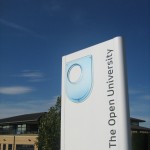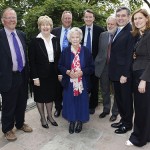Paulo Freire, in Pedagogy of the Oppressed (1972) proposed that
Education either functions as an instrument which is used to facilitate the integration of generations into the logic of the present system and bring about conformity to it, or it becomes ‘the practice of freedom’, the means by which men and women deal critically and creatively with reality and discover how to participate in the transformation of their world.

The OU: a single inflexible menhir?
Can that dichotomy help us understand developments within the OU in the 1980s and 1990s?
In the 1980s the shift away from the idea that academics could describe their own order of existence was noted by OU sociologist Professor Stuart Hall. Writing about the OU in the ‘New Statesman and Society’, 26 November 1993, Hall noted how people describe themselves and their work has been influenced by the audit culture.
The Open University … is filled with good social democrats. Everybody there believes in the redistribution of educational opportunities and seeks to remedy the exclusiveness of British education. And yet, in these last ten years, these good social-democratic souls… have learned to speak a brand of metallic new entrepreneurism, a new managerialism of a horrendously closed nature. They believe what they have always believed, but what they do, how they write their mission statements, how they do appraisal forms… that’s what they are interested in now. The result is that the institution has become transformed.
Writing on 20th December 1993 in the same magazine he proposed a different view when he suggested that the use of discourse was not hegemonic, that it did not change ‘for a minute what is in academics’ hearts and minds’. However, others suggested that the new market discourse could become part of a person’s professional identity. Similar concerns and debates pervaded the development of educational management according to his colleague Paul du Gay and others at the OU (see P du Gay, G Salaman and B Rees, ‘The conduct of management and the management of conduct: contemporary managerial discourse and the constitution of the ‘competent’ manager’, Journal of Management Studies, 33, 3, 263-282.)
The debate about the impact of managerialist ideas was echoed in discussions about the idea of students as active participants in their own learning. This had been promoted by many within IET but was countered by an emphasis on the individual and on knowledge and learning being presented as atomistic, mechanistic and explicit in character. Knowledge was characterised as a resource, like money, which, although it could not be spent, could be possessed and stored, and was sometimes in need of renewal. The language of credit accumulation and a ‘skills audit’ reflected this fiscal framework. Courses (the equivalent of modules at other universities) were the mechanism whereby skills and knowledge were delivered and learning outcomes, the product, assessed. Successful delivery of the product could be quantified in terms of an increase in the knowledge and skills capital belonging to the student who was a container for these skills. The learner was conceptualised as a configuration of needs, wants and accumulated learning which had gaps. In Pedagogy of the Oppressed Freire noted that ‘education maintains and even stimulates the contradiction [between teacher and student] through … attitudes and practices, which mirror oppressive society as a whole’. One of the characteristics was that ‘the teacher knows everything and the students know nothing’. Many at the OU rejected the notion of a person having a space into which leaning outcomes can be placed and sought to empower students, not dominate them. They argued that the conceptualisation of knowledge as packaged sets of pre-prepared sets of materials, marketed as desirable learning outcomes and delivered by part-time academic labour was not a useful one. Rather, knowledge acquisition was socially situated and knowledge was constructed by individuals rather than a possession. Concepts such as ‘key skills’, or ‘records of achievement’ were redolent with locally created meanings and could be negotiated, contested, and reconstructed.
Noble (1997) took up the theme arguing that although technology, radio, television and later the internet, have been seen as the solution to many different problems of higher education such as high costs and the inefficiency of some teaching, virtual education supports the transformation of a public good into a commodity; the development of workers and consumers instead of critical citizens; the homogenization and standardization of educational contents, values and languages and, of course, the digital divide. He concluded that the high-tech transformation of higher education was being initiated and implemented from the top down and that alienation and the reduction of the autonomy and independence of faculties arose from the commercialization of higher education and the commoditization of the research and educational functions of universities.
There were, within the OU’s original model and its subsequent development, practices, metaphors and models which reflected the managerialist and marketized society in which the OU was located. The model of learning as rational-cognitive, conceptualised as the serial acquisition of knowledge through rational, mechanistic private engagement fitted with some notions of programmed learning which conceptualised knowledge as permanent, cumulative and commodified. As a Professor nearing retirement Hall had greater independence than others and may have marginalised the positions of those required to demonstrate appropriate discursive fluency (for the RAE for example) or those who adopted a form of bilingualism in relation to managerialist and other discourses such that their oppositional positions became transitory and marginal. Nevertheless, the OU was a dialogical entity, was composed of many discourses and meanings and while the processes associated with structure and agency of communities of practice were employed to facilitate accommodation there was also reconstruction and some resistance. Freire’s notion of nutually exclusive positions is a useful idea, but not the most satisfactory way of conceptualising discursive contestation at the OU.

